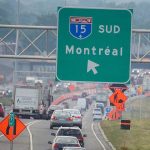 Recently I wrote about a new report from the Urban Transport Group on the powerful potential of open data to transform the way we move about our cities.
Recently I wrote about a new report from the Urban Transport Group on the powerful potential of open data to transform the way we move about our cities.
“Emerging data will mean transport users will become far more fully informed about their travel choices whilst at the same time transform the ability of transport authorities to plan and manage transport networks and services more efficiently and effectively,” it says.
A nice example of what’s possible comes via Montreal, Canada. They’ve teamed up with traffic management company Orange Traffic to install around 100 sensors on the busiest roads in the city. The sensors are designed to detect Bluetooth signals from the mobile phones of drivers, and thus provide planners with a detailed, yet inexpensive method of monitoring traffic flow in the city.
By tracking the vehicle through multiple sensors, the team are able to detect the speed of the traffic as well as its direction. The data is sent to the Urban Mobility Management Center where it is analyzed to help ensure good traffic flow.
The team are at pains to point out that no personal data is tracked, and indeed it’s very difficult to connect a Bluetooth signal to an individual. It’s a good example of the kind of things planners are doing with data to make our cities smarter in relatively inexpensive ways.